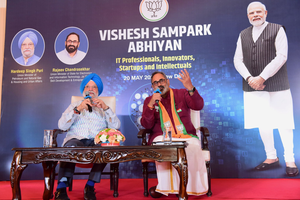






India and Cyprus are both experiencing thriving startup ecosystems and government support for innovation and entrepreneurship.
India has emerged as a leading innovator in sectors such as manufacturing, startups, digital public infrastructure (DPI), aerospace, space, and defense. Government initiatives like Atal Innovation Mission, Start-up India, Stand-Up India, and Digital India have played a transformative role in the Indian economy. India's economy has climbed from the 10th largest in the world in 2014 to the 5th largest, and it is projected to become the third largest. The number of unicorns has surged from four in 2015 to 130 in 2024. The expansion of the digital economy in India has been unprecedented, positioning it as the fastest-growing digital economy globally. The government's supportive ecosystem has propelled India to become a leading innovator in aerospace, space, and defense. Companies like Mamaearth and Dixon Technologies have thrived with the government's backing. Looking ahead, the focus for the next five years should be on creating quality jobs, fostering research, and producing high-quality products. The government's policies have enabled India to manufacture nearly 100% of its mobile phones and are expected to lead to mobile phone exports worth $100 billion. The government has played a crucial role in developing a certified skilled workforce and nurturing a conducive startup ecosystem. It has also opened up opportunities in the space and geospatial sectors, empowering companies like Map My India to serve the nation and achieve self-reliance [c2031c6d].
Cyprus was cited as an example of a thriving startup environment at a major conference in Athens. The technology sector in Cyprus contributes 13% of the country's GDP, second only to tourism. Over 300 fintech companies operate in Cyprus, attracting new companies and human resources. The lack of capital markets integration in Europe was identified as a significant hurdle for promoting innovation. Strict regulations are necessary, but over-regulation can increase costs to unsustainable levels for businesses. Startups in Cyprus are driven to seek opportunities in the US market [60129188].
The Indian startup ecosystem is mature and poised to contribute significantly to the Indian economy, according to Kumara Raghavan, the Head of India Business Development for Amazon Web Services (AWS). Raghavan highlighted the growth of the startup ecosystem in India, with over 7,000 startups and a strong focus on innovation and technology. He emphasized the role of AWS in supporting startups through its various programs and services. Raghavan also mentioned the importance of government initiatives like Startup India and Digital India in fostering the growth of startups. He expressed optimism about the future of the Indian startup ecosystem and its potential to drive economic growth [743636af].
Tech platforms in India, especially those operating in the gig economy, have played a crucial role in large-scale job creation, improved incomes, and stimulated entrepreneurship. These platforms have given India a well-deserved reputation as one of the major start-up hubs in the world. However, it is important for the new government to appreciate the homegrown status of these platforms, their short duration of existence, limited consumer base, and revenues compared to their global counterparts. Policies that take these factors into account will enable these platforms to contribute significantly to India's onward march. The government's support and recognition of the role of tech platforms in job creation and entrepreneurship will be crucial for their continued growth and success [43b52d1d].
Paytm founder Vijay Shekhar Sharma stated that the Indian government has mainstreamed startups and given visibility to founders, shifting from a time when startups ranked at the bottom of the "food chain" in job picks. Sharma credited the government for this shift and described the current period as a "golden period" for founders and entrepreneurs in India. He also urged entrepreneurs to leverage technology and innovation to make the most of the opportunities available to them. Sharma highlighted the growth potential of India's financial services market and emphasized the importance of breaking down jargon and complex terms when communicating with investors. He also predicted that the distinction between fintech and traditional financial companies will blur in the future. Sharma concluded by stating that the future is bright for financial services in India [1cc36ca9].
India and Cyprus are both experiencing thriving startup ecosystems and government support for innovation and entrepreneurship. These initiatives are driving economic growth and positioning both countries as leaders in the global startup landscape [29d1e3e7].
India's Digital Competition Bill, based on Europe's Digital Markets Act, has sparked a polarizing debate on market practices. The rushed adoption of a foreign framework without considering India's unique digital landscape raises questions about the bill's true intent. It is important for the government to recognize the homegrown status of Indian tech platforms and the role they play in job creation and entrepreneurship. Policies that support and recognize the contributions of these platforms will be crucial for their continued growth and success. The government should consider the short duration of existence, limited consumer base, and revenues of these platforms compared to their global counterparts when formulating regulations. Taking these factors into account will enable Indian tech platforms to contribute significantly to India's economy [237e734b] [3392d4d0].